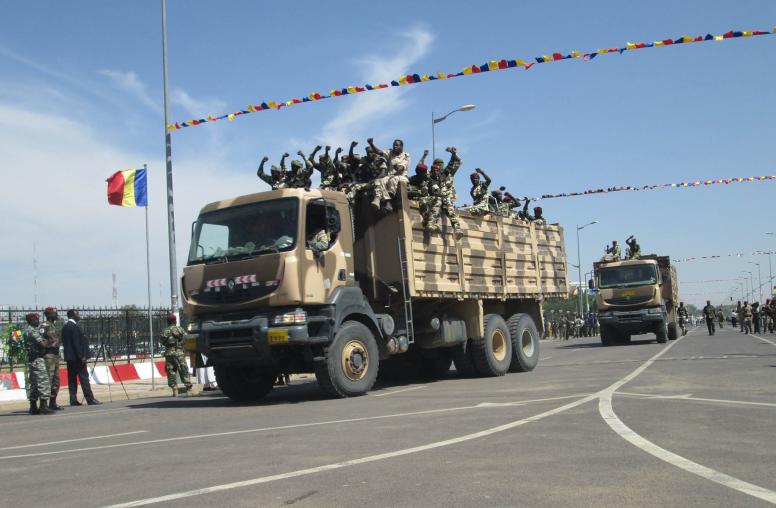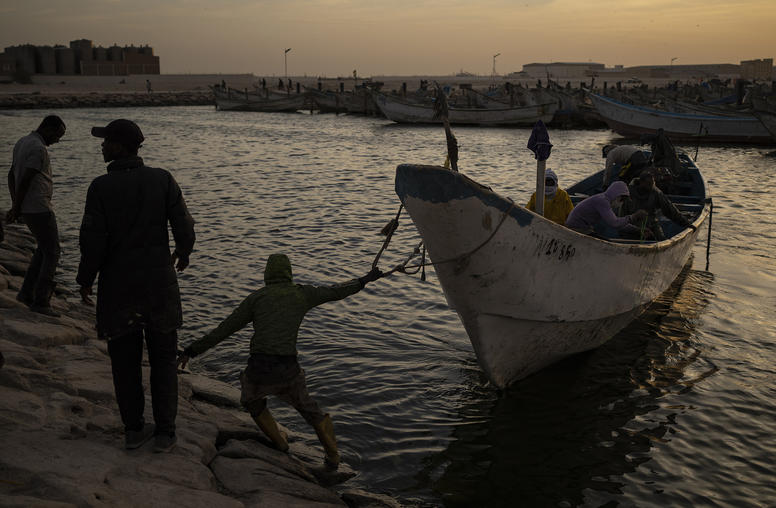Chad: President Déby’s Death Leaves Vacuum in Volatile Region
Now, the West must grapple with the loss of a longtime regional ally in counterterrorism as Chad’s political stability is in question.
The sudden violent death of Idriss Déby, the leader of Chad since 1990, throws the central African country into uncertainty. During a visit to the military frontline, Déby was allegedly killed in fighting in the country’s Lake Chad region, just days after the uncompetitive April 11 presidential elections in which he was re-elected for a sixth term. As USIP’s Kamissa Camara and researcher Jérôme Tubiana explain, Déby’s death does not change the structural deficiencies of the Chadian state. At the same time, Déby’s death leaves the West without a long-time ally in counterterrorism in the greater Sahel and Lake Chad Basin, and how the transition is managed has implications for the wider region, too.

Déby ruled Chad for decades. How does his death change Chad as a country?
Camara: Déby’s death does not immediately change deep-rooted patterns of political and military violence in Chad, which despite considerable mineral resource wealth — including gas — and a modest-sized population, remains very poor. Déby himself came to power by force, overthrowing President Hissène Habré in December 1990. Habré also came to power by force. There are thus deeply entrenched trends of military strongmen ruling Chad with their own narrow agendas; it is unclear that this will now change, even if Déby is gone.
Tubiana: Déby's death removes the main obstacle to political change in Chad. Déby was involved in many of the details of how the Chadian state functioned. He also had personally prevented discussions about his succession, including within his own Beri ethnic group (also known as the Zaghawa); although as Marielle Debos and I warned in 2017, there were risks of a dynastic succession in Chad, and the possibility that: “ … Déby would prepare one of his sons to replace him, effectively establishing a dynasty … even if, according to Déby’s relatives, none has really been groomed to assume the presidency and none would have unanimous support among the Beri.”
However, what did not change in Chad is that political change still seems possible only by violent means, whether by taking up arms and launching a raid on the capital city or by assassinating a military dictator at the front. Three successive presidents have hailed from rebel movements and took power by force, and others have made attempts to follow this path to power. Yet the means of Déby’s death on the battlefield is important, too. Popular support for the rebels is likely to grow, although old feuds between and among the rebels could also re-emerge.
Chad just held elections, which saw Déby re-elected for a sixth term. What happens now?
Camara: There is a lot of uncertainty at the moment. The constitution puts the speaker of parliament in charge of the country in the event the president dies. Instead, however, a transitional military council has been announced, composed mostly of figures from Chad’s security agencies, and led by Déby’s son, army general Mahamat Déby, also known as Mahamat Kaka. Kaka is 37, about the same age as his father when he came to power in 1990. The military council has suspended (and violated) the constitution. The current terms of the transition have been rejected by Chadian civil society, opposition political parties, trade unions and rebel movements. For the African Union, this also raises the question of whether Chad is now violating the prohibition in the African Charter on Democracy, Elections and Governance on unconstitutional changes of government. Civil society and official and armed opposition do not want more military rule and are calling for negotiations to take place to determine the way forward.
Tubiana: Déby repeatedly changed the constitution to allow his stay in power. The recently held election was a foregone conclusion, with Déby barring some of his opponents from the contest and others boycotting the election, continuing the long-established electoral trend of “rigged votes and broken promises of peaceful political change.” Now, of course, Déby’s election victory is irrelevant. So far, unarmed and armed opponents and civil society leaders have called in vain for peaceful democratic change via a fair election or negotiated dialogue, but these calls do not seem to have been taken seriously by Chad's main foreign backer, France, or by the new transitional military council. Neglecting desires for democratic change in Chad and the continuation of France’s long-standing policy is likely to mean that opinions of France will continue to deteriorate in Chad and ensure some Chadian rebel leaders continue to voice anti-French rhetoric. Still, it is unclear whether the military council aims to organize a negotiated transition which might include the armed and unarmed opposition, aim to govern as a military junta, or be a prelude to the formal dynastic succession of Mahamat Déby. Mahamat has some legitimacy within the army and support among the Zaghawa, but this does not mean that such support is unanimous or consolidated.
How will Déby’s death affect Western counterterrorism strategy in the Sahel and broader regional stability?
Camara: Déby was a strategic partner for both Paris and Washington, given his involvement in counterterrorism in the Sahel and in the fight against Boko Haram in Nigeria and the Lake Chad Basin. Thousands of French troops are based in Chad and conduct operations in the region. Chadian soldiers themselves are among the most capable in the Sahel and have been deployed in combat and support roles in the regional G5 Sahel Joint Force, the United Nations Multidimensional Integrated Stabilization Mission in Mali (MINUSMA), and the Multinational Joint Task Force (MNJTF) against Boko Haram, which is headquartered in Chad. It is unclear how these engagements may be sustained under new leadership.
Tubiana: Déby’s death has repercussions beyond Chad itself, particularly for its eastern neighbor, Sudan, with which Chad has long had a complicated relationship. Chad had seemed to act as a stabilizing influence in Darfur, and Déby’s once uneasy relations with Darfur’s rebels appeared to have improved considerably in recent years. Déby had established good relations with Sudan’s new strongman, Mohamed Hamdan Daglo, more commonly known as Hemetti, benefitting from their international alignment with the United Arab Emirates, Saudi Arabia and Egypt. It is widely believed in both Chad and Darfur that Hemetti could be tempted to back an Arab takeover of Chad or at least feel obliged to financially, politically and militarily support his Mahariya kin in Chad. Déby appeared to be aware of this risk and tried to mitigate the potential of a new Arab rebellion by strengthening ties with Chadian Arab politicians, and, via the same politicians, with Hemetti himself.
Since May 2019, the Chad-Sudan rapprochement changed from a personal deal between Déby and Sudan’s former leader, Omar al-Bashir, to a new personal deal between Déby and Hemetti. As a result of their improved relationship, Déby supported Hemetti’s attempts to ally with Darfuri rebels. N’Djaména also pressured Darfuri rebels to make peace with Khartoum, so if Chad becomes internally preoccupied or itself descends into conflict, the good offices role N’Djaména has played in Sudan’s conflicts may weaken, at a time when the latest Sudan peace deal is under significant stress. It is unclear whether Déby’s successors will be able to maintain the same strong relationship, although Hemetti's cousin, Bichara Issa Jadallah, the former Chadian army chief of staff, is a member of the new transitional military council.
In addition, the Sudanese military leadership is likely to support French policy in Chad and the Sahel, as it recently expressed the desire to join the G5 Sahel force in order to strengthen its links with France. Hemetti has said that Déby's partnership with France be a model for his Rapid Support Forces, who are already claiming to fight terrorism and migration on behalf of Europe.
France seems to be backing the military council and consequently be willing to continue a policy of unconditional political and financial support to an authoritarian regime in exchange for the deployment of the Chadian army and cooperation in its various operations against terrorism in the Sahel. While France may be satisfied by a military take-over or a dynastic succession, this sends negative signals to democrats in and outside Chad, and may have implications in neighbors Mali and Sudan, where militaries are also attempting to dominate ongoing political transitions, albeit in varied circumstances. Moreover, backing authoritarians unconditionally is sensitive now that France is trying to recruit other European states to participate or support its stabilization interventions, including Operation Tacouba in Mali.
Jérôme Tubiana is a researcher who specializes in Chad and Sudan and co-authored, with Marielle Debos, the 2017 USIP Special Report, “Déby’s Chad: Political Manipulation at Home, Military Intervention Abroad, Challenging Times Ahead.”



